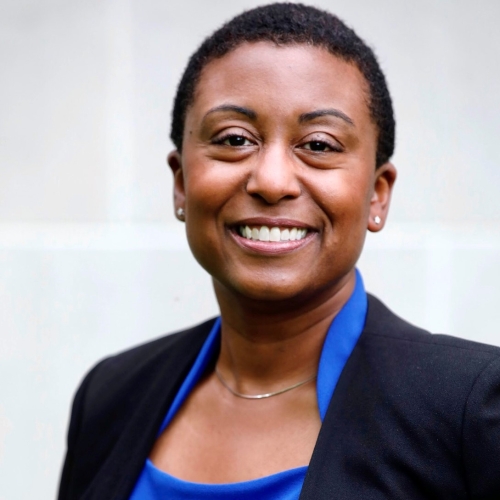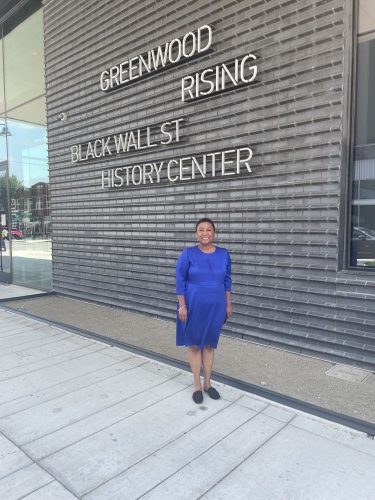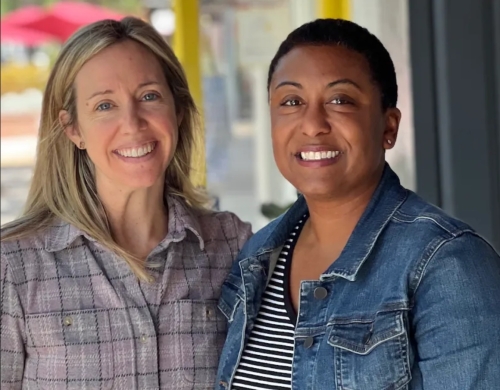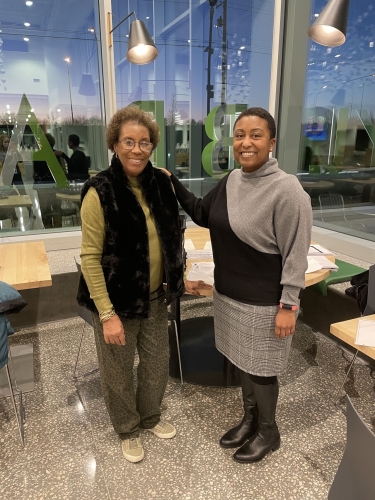A Kansas City Journalist Takes An 'Immersive' Dive Into the Nation's Racial Wealth Gap in New Book

This article first appeared on KCUR.org and aired on July 26, 2024. Listen to the interview here.
In the summer of 2020, with protests for racial justice around the country after Minneapolis police murdered George Floyd, then-Wall Street Journal colleagues Ebony Reed and Louise Story decided to turn their focus to race and money.
So Reed, a graduate of the Missouri School of Journalism who relocated to Kansas City the same year, spent the next three years conducting with her colleague nearly 400 interviews with Black Americans across the country.
The conversations helped reveal “the dollars and the cents of their own financial situation,” the colleagues write in their new book, “Fifteen Cents on the Dollar: How Americans Made the Black-White Wealth Gap.”
Reed, who teaches a class with Story on race and money at Yale School of Management, says the title reflects a stark statistic. According to Federal Reserve data, a typical Black family has 15 cents in wealth for every dollar a typical white family has in wealth.
“Families that have less wealth are thinking about how they will pay for day care for their children, how they will fund higher education, how they will think about their retirement,” Reed says. “Can they afford to buy a home if there is a downturn? Can they survive that downturn? Do they have enough wealth and savings to ride it out?”
The book is grounded in Atlanta, Georgia, in large part because of a banking effort that launched in the summer of 2020 called Greenwood Bank, named for the historic Black Wall Street district in Tulsa, Oklahoma, that was destroyed in a 1921 race massacre.
“Greenwood Bank had the stated mission to close the Black-white wealth gap and to work on equity and banking, and so that is why we decided to follow the bank,” Reed says.

The bank’s founders added another level of interest for Reed and Story. They include former Atlanta mayor and civil rights leader Andrew Yang, media executive Ryan Glover, and Michael Render, better known as Grammy Award-winning rapper Killer Mike.
“The other people that are included in the book, those that we focus on in-depth, are people that either were their customers, or fit the profile of a customer they were trying to reach,” Reed says.
Early in the COVID pandemic, Reed and Story did interviews by Zoom or over the phone, but Reed describes their later work as “immersive journalism.”
When they didn’t hear back from someone by phone or email, they’d hop a flight and knock on someone’s door instead. In Jefferson, Georgia, they tagged along with one family to the Crawford W. Long Museum to discuss family ties.

They also traveled to eastern Georgia in September 2021 to participate in a 63-mile “justice walk” with New Hampshire resident Brook Bacon, one of seven people they followed in the book.
“His family had lived in that part of Georgia and his father resided there,” says Reed, “and his father had been killed the summer before by police.”
“He was trying to bring attention to his father's situation and bring justice for his family,” she says.
To chronicle the experience, Reed and Story walked more than 30 miles with Bacon over three days.
Although much of the book is set in Atlanta, as the authors traced people’s family trees, their research took them all around the country.
Following the family connections of one of Greenwood Bank’s founders led Reed to Oklahoma, California, Michigan, and closer to home.
After a conversation with family historian Beverly Rentie about research, family trees, and members of the Rentie family who had been enslaved by Native Americans, the two realized they lived about 15 minutes away from each other.
“And I literally almost dropped my cell phone because I thought, ‘Are you kidding me?’” Reed remembers. “She says, ‘I live in Kansas City.’ And I said, ‘I do too!’”
Reed and Rentie later met at a nearby library.
“She brought her records and I brought some things, and we sat and we talked,” Reed says.

“'Fifteen Cents on the Dollar,'” she says, is not just a book, it’s a “public impact project.” That’s part of why Reed and Story have pledged a portion of their profits from the book to organizations focused on women’s empowerment, education and journalism.
They’ve also traveled the country hosting racial wealth-gap symposiums, the first of which took place in February in Kansas City.
“We are working hard to make 15 cents on the dollar a nationally recognized statistic,” Reed says. “And we think if more people understood this statistic and the implications in life today for Black Americans, that this could impact conversations that people are having in communities, ranging from affordable housing, jobs, education and many other areas.”
Ebony Reed will discuss “Fifteen Cents on the Dollar: How Americans Made the Black-White Wealth Gap” with Kansas City resident Beverly Rentie and the Kansas City Star’s Mará Rose Williams at 6 p.m. on Tuesday, July 30, at the Kansas City Public Library’s Plaza Branch, 4801 Main Street, Kansas City, MO 64112. RSVP here.
This story was produced in partnership with the KCUR 89.3.